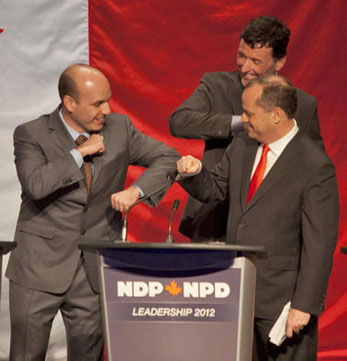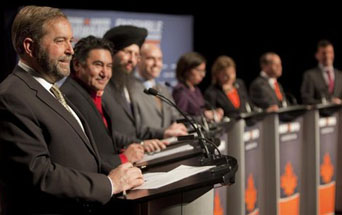Is Nathan Cullen the conscience of New Democrat race in Canada?
Jan 30th, 2012 | By Randall White | Category: In Brief
NDP federal leadership candidates Nathan Cullen, left, Brian Topp, and Paul Dewar bump elbows following the conclusion of a leadership debate in Halifax on Sunday. TIM KROCHAK/THE CANADIAN PRESS.
Anyone who has been talking even a little to NDP friends and colleagues won’t be surprised to hear that, at the party’s Sunday, January 29 federal leadership debate in Halifax, Nathan Cullen came under some heavy fire, “over his plan to hold joint nomination meetings with other parties in Conservative-held ridings to avoid splitting the vote and potentially re-electing a Tory government in 2015.”
(See, eg: “Nathan Cullen on defence during rare show of sparks at NDP leadership debate” ; “NDP leadership hopefuls target Mulcair in second debate” ; “NDP leadership candidates highlight differences in Halifax debate” ; and “Mulcair, Cullen and Dewar main targets of attack in NDP debate.”)
Note that Mr. Cullen is NOT talking about any kind of Liberal-NDP (or even NDP-Liberal) “merger” – of the sort that Ontario Liberal Premier Dalton McGuinty also spoke out strongly against at the recent federal Liberal convention in Ottawa. Mr. Cullen is just talking about co-operating with the other two main progressive parties in Canada – the Liberals and the Greens – to very practically combat the poignant and troubling political fact that Stephen Harper’s quite non-progressive Conservatives won a decisive majority of seats in the federal parliament last year, with just under 40% of the cross-Canada popular vote.
(And there is every indication that, without some arrangement of the sort Nathan Cullen is proposing, the Harper Conservatives could very likely give us deja vu all over again in 2015.)

Ukrainian protesters outside the World Economic Forum in Davos, Switzerland at the weekend. The NDP leadership debate in Halifax, Canada on Sunday had nothing quite like this. Too bad! Anja Niedringhaus/AP Photo.
It does seem clear enough by now that Mr. Cullen’s progressive co-operation proposal is not widely popular among NDP party activists, who understandably care more about the party as an institution (and career path?) than about the broader progressive cause in Canada today. In the Halifax debate some front-running leadership candidates were trying to capitalize on this exclusive party loyalty among activists.
“Why don’t you think it’s enough to get progressives to rally around our banner?” Thomas Mulcair asked Cullen: “Why would you shoot for the bronze medal when you know that Canadians share our goals, share our vision?” Peggy Nash “said the proposal would strip Canadians of their democratic right to vote for the party of their choice … ‘We had a historic breakthrough in the last election. Why not build on that?’”
Yet from the standpoint of we ordinary progressive voters, who just want to see some kind of progressive government in Ottawa after the next election, what Nathan Cullen is standing up for so impressively, and even idealistically in some respects, still makes a lot of down-to-earth common sense. The latest Nanos poll on federal party standings, eg, suggests that the NDP’s “historic breakthrough in the last election” is not something cast in stone.
(“Support for the federal New Democrats continues to erode in Quebec and Ontario with the Liberals showing some gains … The Tories have 35.7% support, down slightly from December, followed by the Liberals at 27.6% and the Opposition NDP at 25.2%.” Not quite nine months after the historic breakthrough election, that is to say, the Liberals, under the interim leadership of a former NDP provincial premier, have already jumped back into second place!)

NDP federal leadership candidate Thomas Mulcair, left, responds to a question during an NDP leadership debate in Halifax Sunday January 29, 2012. To Mulcair's left are fellow candidates Romeo Saganash, Martin Singh, Nathan Cullen, Niki Ashton, Peggy Nash, Brian Topp and Paul Dewar. This was the second of six travelling debates before a new party leader is chosen on March 24 at a party convention in Toronto. THE CANADIAN PRESS/Tim Krochak.
To reduce everything to my own narcissistic ordinary voter’s concerns, I am on record myself as newly disenchanted with the Liberals over the issue of the British monarchy’s future in Canada – a matter on which Nathan Cullen also has a recent record of which I very much approve.
But even if I do wind up voting NDP in my riding in 2015 as a result of this disenchantment, I would do this much more enthusiastically if I knew that Mr. Cullen’s kind of co-operative arrangements among the NDP, Liberals, and even the Greens were going to make some kind of co-operative progressive government in Ottawa a very real and serious possibility.
And if both the Liberals and the NDP decide that their own institutional and professional futures as political parties are much more important than the future of the broader progressive cause in Canada, in 2015 I just might decide that there is not much point in voting at all –Â like other ordinary progressive voters, from coast to coast to coast!
(If yet another Harper Conservative government is inevitable, no matter what I do, why bother?)


I am cynical about an informal merger between the Liberals and NDP. I do think that supporters of the Liberal Party seek some kind of merger as a way to neutralize the NDP.
The NDP became the official opposition in last year’s federal election. The Liberals became the third party. This is one reason why there are suggestions of a merger of some sort. Had the Liberals come second or first, I doubt that there would be any suggestions of a merger. In Ontario, Dalton McGuinty’s Liberals won the provincial election with a minority government. There are no suggestions of a merger between the provincial Liberals and NDP.
Merge? No, thanks.
As I tried to stress in my own comments above, “Note that Mr. Cullen is NOT talking about any kind of Liberal-NDP (or even NDP-Liberal) “merger†— of the sort that Ontario Liberal Premier Dalton McGuinty also spoke out strongly against at the recent federal Liberal convention in Ottawa.” And, as I read what he’s saying, Nathan Cullen is NOT talking about any kind of “informal merger” either.
He’s talking about intelligent co-operation, and just making the obvious enough point that if both progressive parties continue to put their own self-interest ahead of the interests of we increasingly cynical mere progressive voters, the Conservatives will just keep forming governments in Ottawa. I sometimes cynically wonder myself if that isn’t what some New Democrats and Liberals really want? They are happier being critics and don’t want to take responsibility for actually governing the country?
Now, if the New Democrats suddenly start polling ahead of even the Conservatives, and well ahead of the Liberals (instead of going back to third place, as the latest Nanos poll suggests), that will of course be a different story altogether. But it hasn’t happened yet. And Mr. Cullen;s argument still makes a lot of sense to ordinary voters like me, who don’t belong to any party.
I think a better option then holding a primaries to elect a single progressive candidate in a Conservative incumbency, is for the NDP-LIBs-Greens decide on which CPC ridings to target, then divy them up. ie Greens would take Saanich-Gulf Is; NDP would select Winnipeg’s Elmwood–Transcona; Libs would select Toronto’s York-Centre. By not contesting Elizabeth May’s riding Greens would not run candidate’s in the other 2 ridings. Outcome 2 ridings taken back from the Conservatives. I’d call that a Win-Win!
Ken S,
I like Nathan’s idea because it leaves the decision up to riding associations. That seems more fair/democratic.
This is a great story. I’m a very passionate NDP activist (I’ve had a poster of Jack Layton up in my room since I was 16) and it took me a while to wrap my head around his idea. The more that I think about this the more I am sure it’s the right thing to do.
It’s especially beneficial since the he’s vowed to bring in electoral reform as his first priority, so this would be a one time plan that would a.) prevent a Harper majority and b.) fix the system.
I respect Nathan for being realistic and proposing a viable option for success in 2015, while the others stubbornly suggest that progressive Canadians should either vote for their party or face the consequences.
Thank you Randall White for explaining Nathan Cullen’s idea so clearly. Nathan’s plan is for the good of the country. Like Heather Tuite says, once electoral reform is brought in, this type of intelligent co-operation will no longer be required.
I also thank Randall White for a great article on this very important topic!
I’ve talked to many progressive “ordinary voters” who fully support some sort of co-operative effort by NDP/LIBS/GREENS to finally and decisively defeat Stephen Harper.
And Nathan Cullen’s solution is particularly a good one because it avoids the dreaded “Merger” that the party elites are so afraid of. So thanks to Nathan Cullen for being brave enough to jeopardize whatever small chance he might have had to become leader by putting forward a solution that makes eminent sense to a whole lot of “ordinary voters”. If I could vote, he would certainly have mine!